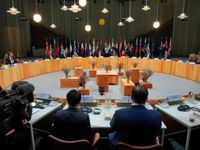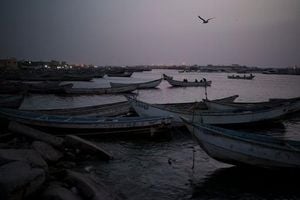On August 30, 2025, foreign ministers from all 27 European Union member states gathered in Copenhagen for an informal meeting that was anything but routine. The agenda was dominated by a single, harrowing topic: Israel’s ongoing war on Palestinians in Gaza, a conflict that, according to the United Nations and Gaza’s health authorities, has killed more than 63,000 people since October 2023. The humanitarian crisis, described by experts as a genocide and now officially declared a famine by a UN-backed global hunger monitor, has sparked outrage across Europe and renewed calls for the EU to take decisive action.
Yet, as the ministers convened in the Danish capital, the divide among EU nations was stark. The bloc’s foreign policy chief, Kaja Kallas, set the tone with striking candor. “I’m not very optimistic, and today we are definitely not going to adopt decisions,” she told journalists before the talks began, as reported by EUobserver and Al Jazeera. “It sends a signal that we are divided.”
That division was on full display. While a growing number of EU countries—led by Belgium, France, Ireland, Luxembourg, the Netherlands, the Nordic countries, Slovenia, and Spain—have pushed for sanctions against Israel, others, most notably Germany and the Czech Republic, have stood firmly in opposition. The Czech foreign minister, Jan Lipavský, even went so far as to question the credibility of UN reports on Gaza starvation, echoing Israeli denials. Germany’s foreign minister, Johann Wadepuhl, dismissed proposals to suspend Israel’s participation in Horizon Europe, a major EU science program, calling it unrelated to Israel’s military actions and therefore unwarranted.
Austria and Italy, meanwhile, offered only limited support—backing the idea of blacklisting some extremist settlers in the West Bank, but stopping short of broader economic measures. Latvia’s foreign minister, Baiba Braze, framed Israel’s actions as falling within its “legitimate right to self-defence” against Hamas, a stance that resonated with several Central and Eastern European states. Estonia and Lithuania, for their part, focused on Russia in their press briefings and largely sidestepped the suffering in Gaza.
The practical upshot of all this? Most meaningful sanctions—such as blacklisting settlers, banning settler imports, or imposing an arms embargo—require consensus among EU members. With the Czech Republic and Hungary ready to wield their vetoes, and Germany and Italy unwilling to back even more modest measures, the prospects for action are slim. Some options, like freezing Horizon Europe participation or suspending Israel’s EU free-trade perks, could theoretically move forward by qualified majority, but without the support of Germany and Italy, there simply isn’t the necessary backing.
Denmark’s foreign minister, Lars Løkke Rasmussen, whose country supports sanctions, argued that the EU could impose “crippling trade tariffs” on Israeli settler imports by a majority vote, thereby bypassing potential vetoes. But even this proposal faced a dead end: without German or Italian support, a majority remained out of reach. And, as Rasmussen himself acknowledged, settler imports to the EU amount to just €200 million a year—a mere drop in the ocean compared to the €47 billion in annual EU-Israel trade.
As the meeting unfolded, the emotional toll of the crisis was palpable. French foreign minister Jean-Noël Barrot called the Israeli-created famine “simply unacceptable.” Sweden’s Maria Malmer Stenegard described the situation in Gaza as “absolutely devastating and it breaks my heart.” Spanish foreign minister José Manuel Albares did not mince words, saying civilians were “starving to death due to an induced famine by Israel.” Ireland’s Simon Harris accused Israel of “genocidal activity” and voiced his frustration at the EU’s inertia: “If the EU didn’t take collective action against Israel by now, when will it ever—what more will it take? Children are starving—in fact, we now have reports of children who cannot even cry because they don’t have the strength.”
The calls for action have not been limited to government officials. Across Europe, protesters have taken to the streets in growing numbers, demanding that their governments do more to pressure Israel to end its bombardment and blockade of Gaza. As Al Jazeera correspondent Hashem Ahelbarra reported from Copenhagen, “More and more people across Europe say that the EU failed to deliver on the promises it made when it comes to the protection of humanitarian law and human rights.” The pressure, he noted, is immense: “There is huge pressure on them to deliver.”
Even so, the EU’s executive body has struggled to marshal enough support for even the most modest punitive measures. Last month, it proposed curbing Israeli access to an EU research-funding program, but the idea has languished amid opposition from key member states. France, the Netherlands, Spain, and Ireland have backed the proposal, but Germany and Italy remain holdouts. As a result, no consensus—or even a qualified majority—has emerged.
Hadja Lahbib, the European commissioner for crisis management, summed up the mood of frustration and urgency. “It is time for the EU to find a collective voice on Gaza,” she said earlier in the week, declining to specify what actions she favored but making clear that “more pressure on Israel” was needed. “What is happening there is haunting me and should haunt all of us,” Lahbib told reporters in Brussels. “Because this is a tragedy. And we will be judged by history.”
Meanwhile, the situation on the ground in Gaza continues to deteriorate. Since the last EU foreign ministers’ meeting on July 15, the UN has declared famine in the territory, and the death toll has surpassed 63,000, with most victims being civilians. Israel has also launched a ground assault on Gaza City and announced the construction of a new settlement, E1, in the West Bank—a move widely seen as the final blow to the long-discussed two-state solution.
The EU ministers also discussed new sanctions on Russia for its invasion of Ukraine, but Norway’s foreign minister, Barth Eide, who attended the Copenhagen meeting, highlighted the bloc’s credibility gap: “If we want to have any credibility in our critique of Russia ... we also have to stand up against the massive atrocities committed by Israel.”
As the ministers left Copenhagen, there was little sense that the EU would move beyond words anytime soon. The next formal meeting is scheduled for October 20, but few expect a dramatic shift. As Spanish foreign minister Albares put it, “The time of declarations is really over. We have to move forward.” Yet, for now, Europe’s divisions remain, and Gaza’s tragedy continues, largely unchecked by the continent’s political might.




